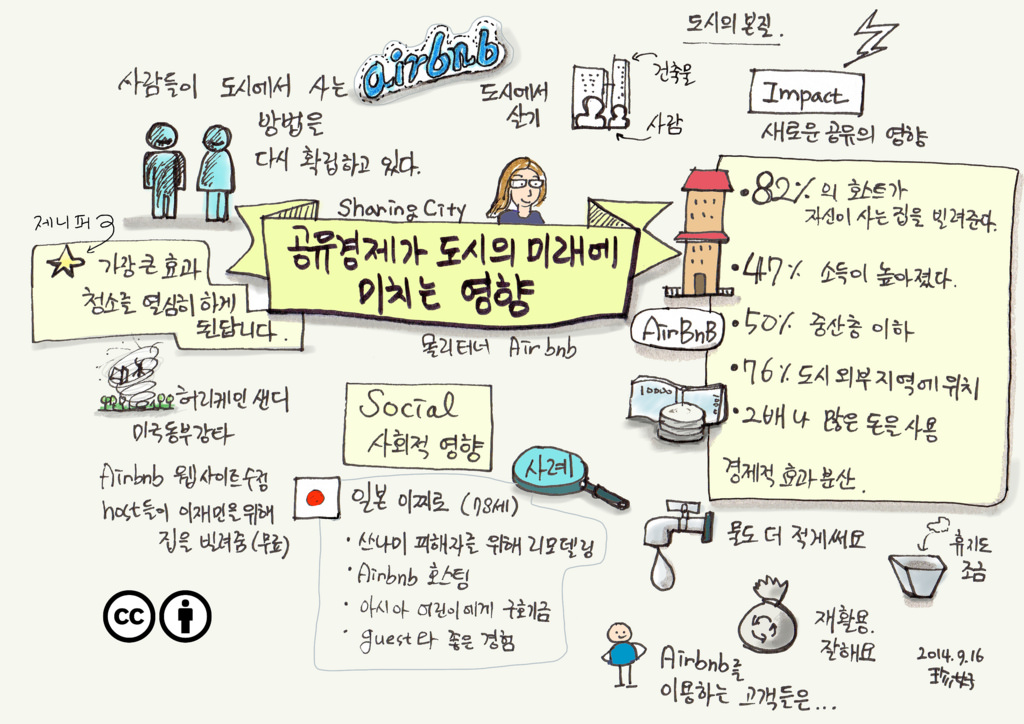List
Story > NEWS > Detail
[Seoul News] "The Characteristics of Sharing in a Shared Economy"
The shared economy can be spotted in two parts. What you want to argue depends on whether you are focusing on "share" or "economy." For example, if you focus on 'share', you focus on sharing certain goods or services with others and enhancing their value, rather than monopolizing them with exclusive ownership. Similarly, when we focus on 'economy', we set our core content, including brokerage fees and improved economic efficiency, around the platform.
This time, let's focus on "share" and learn about the characteristics of "share" in the economy.
First is non-contractability. In a broad sense, a contract means a consensus or commitment of different opinions, such as a proposal and acceptance of it. In the shared space, formal contracts are not required because they are negotiated between the participants based on trust from the other party. The terms of use are described in detail in the original sense and cannot be modified easily once established. And it's able to do that by force with the help of the law, as well as the specific responsibilities and rights that arise. However, in relation to these contracts, the private law sets out the terms 'legal' and 'goodwill'. Good relationships are generally expressed in social relationships such as love, friendship, and friendship. Shares are also "non-contractual" because they are formed in such goodwill.

The second is Ho Hye Sung. Reciprocity is associated with the moral obligation of exchange. This is related to the motivation of the share. Recipients in economics include both monetary and non-monetary characteristics, but in sociology or anthropology they are non-monetary and non-market exchanges that are opposed to commercial transactions. The range of sharing means reciprocity in the sociological sense. Common reciprocal benefits mean altruistic exchange relationships. But altruism does not entail any reward, nor does it entail an indisputable obligation to pay back when the requester needs it and the receiver has the ability to repay it. Common reciprocal terms include sharing, hospitality, free gifts, and help.
Third is value in use. The value of a good can be divided into 'exchange value' and 'use value'. The value in use is a value that is attributable to the usefulness of a good and can only be realized by consumption. Exchange value, on the other hand, is a relative value compared to other goods, only when the goods are treated as goods. Shares are used with others, unlike whole milk, which uses goods exclusively. Therefore, in order to be able to be shared, the value in use of the goods must be retained by the owner. The concept of public use during use is appropriate for sharing current meaning. Public use is the use of a single product that is used by multiple people, and can be used many times with a single permission.

The fourth is interaction. Sharing is an economic activity that constantly interacts with each other. Interactions are in a broad sense the various physical and psychological interactions between people or objects and people. The biggest difference between a shared and a market economy is this interaction. Typically, the economic exchange made in the market is based on an objective-oriented, impersonal operating principle. That's why people's relationship in the poet has alienation as well.
Fifth is open-door. In general, sharing has been formed based on individual trust. It appeared in small, closed communities such as dependable families and relatives. However, since entering modern society, sharing has become open as urban population is increasing and transportation and information and communication technologies are being developed. The more open the share, the more open it is, the more positive the social impact it has. Typically, social capital, such as trust, reciprocity, etc., makes it easier for members to ask for or receive help from each other. When sharing is open, the social capital is re-created with continuous interaction in the sharing process.
So we've looked at the characteristics of sharing in a shared economy. We can't cover all the characteristics of the share, but I think we've basically looked at the nature of the share. It is up to you to further expand the territory of the shared economy that has not yet been mentioned.
The shared economy can be spotted in two parts. What you want to argue depends on whether you are focusing on "share" or "economy." For example, if you focus on 'share', you focus on sharing certain goods or services with others and enhancing their value, rather than monopolizing them with exclusive ownership. Similarly, when we focus on 'economy', we set our core content, including brokerage fees and improved economic efficiency, around the platform.
This time, let's focus on "share" and learn about the characteristics of "share" in the economy.
First is non-contractability. In a broad sense, a contract means a consensus or commitment of different opinions, such as a proposal and acceptance of it. In the shared space, formal contracts are not required because they are negotiated between the participants based on trust from the other party. The terms of use are described in detail in the original sense and cannot be modified easily once established. And it's able to do that by force with the help of the law, as well as the specific responsibilities and rights that arise. However, in relation to these contracts, the private law sets out the terms 'legal' and 'goodwill'. Good relationships are generally expressed in social relationships such as love, friendship, and friendship. Shares are also "non-contractual" because they are formed in such goodwill.

The second is Ho Hye Sung. Reciprocity is associated with the moral obligation of exchange. This is related to the motivation of the share. Recipients in economics include both monetary and non-monetary characteristics, but in sociology or anthropology they are non-monetary and non-market exchanges that are opposed to commercial transactions. The range of sharing means reciprocity in the sociological sense. Common reciprocal benefits mean altruistic exchange relationships. But altruism does not entail any reward, nor does it entail an indisputable obligation to pay back when the requester needs it and the receiver has the ability to repay it. Common reciprocal terms include sharing, hospitality, free gifts, and help.
Third is value in use. The value of a good can be divided into 'exchange value' and 'use value'. The value in use is a value that is attributable to the usefulness of a good and can only be realized by consumption. Exchange value, on the other hand, is a relative value compared to other goods, only when the goods are treated as goods. Shares are used with others, unlike whole milk, which uses goods exclusively. Therefore, in order to be able to be shared, the value in use of the goods must be retained by the owner. The concept of public use during use is appropriate for sharing current meaning. Public use is the use of a single product that is used by multiple people, and can be used many times with a single permission.

The fourth is interaction. Sharing is an economic activity that constantly interacts with each other. Interactions are in a broad sense the various physical and psychological interactions between people or objects and people. The biggest difference between a shared and a market economy is this interaction. Typically, the economic exchange made in the market is based on an objective-oriented, impersonal operating principle. That's why people's relationship in the poet has alienation as well.
Fifth is open-door. In general, sharing has been formed based on individual trust. It appeared in small, closed communities such as dependable families and relatives. However, since entering modern society, sharing has become open as urban population is increasing and transportation and information and communication technologies are being developed. The more open the share, the more open it is, the more positive the social impact it has. Typically, social capital, such as trust, reciprocity, etc., makes it easier for members to ask for or receive help from each other. When sharing is open, the social capital is re-created with continuous interaction in the sharing process.
So we've looked at the characteristics of sharing in a shared economy. We can't cover all the characteristics of the share, but I think we've basically looked at the nature of the share. It is up to you to further expand the territory of the shared economy that has not yet been mentioned.



